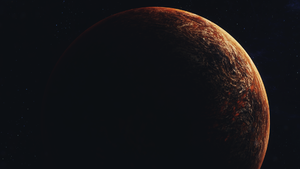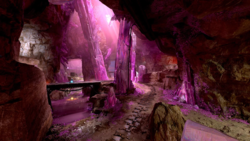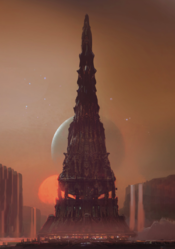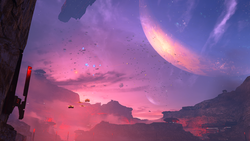Suban: Difference between revisions
From Halopedia, the Halo wiki
m (→Overview) |
Sith Venator (talk | contribs) |
||
| Line 101: | Line 101: | ||
*''[[Halo: Outcasts]]'' {{Mo}} | *''[[Halo: Outcasts]]'' {{Mo}} | ||
*''[[Sunrise on Sanghelios]]'' {{Mo}} | *''[[Sunrise on Sanghelios]]'' {{Mo}} | ||
*''[[Battle for the Blood-Moon]]'' | |||
==Sources== | ==Sources== | ||
Revision as of 04:02, November 28, 2023
| Suban | |
|---|---|

| |
| Astrographical | |
|
System: |
|
|
Orbiting: |
|
|
Orbital position: |
First moon[2] |
| Societal | |
|
Demonym: |
|
|
Species: |
Sangheili (Non-native) |
|
Government: |
|
Suban is one of the two massive natural satellites of Sanghelios, along with Qikost.[1] Suban is reddish in color[7] and is referred to as the "blood-moon of Sanghelios."[8]
Overview
Orbital characteristics
Suban is the closer of the two moons orbiting Sanghelios.[2] The large sizes of both Suban and Qikost greatly affect the tides on Sanghelios.[9][6]
Topography and ecology
Suban's surface hosts water[10] and at least one jungle, at the crater of Kovokel.[11] The moon also features rocky, mountainous regions, some of which are the location of blamite mines.[12] Blamite is an exotic metastable crystal used to manufacture the ammunition for Needle-based weaponry, such as the Needler. Suban is the only known location where blamite—also called "Subanese crystals"—can be found, with veins of blamite running throughout the moon's interior.[13][14][6]
Suban is home several species of indigenous fauna, including the qoerith slug.[15] While the Sangheili are indigenous to Sanghelios rather than Suban, the moon hosts several large Sangheili population centers, major industrial sites, and significant armories.[16]
Locations
Known residents
History
The Former Age
- Main article: The Former Age
Prior to the formation of the Covenant between the Sangheili and San'Shyuum, Suban held significant religious importance for the Sangheili. Its Spire of Miatistina was fabled to serve as a spiritual convergence point between of the wills of the gods and their celestial counterparts Urs, Fied, and Joori.[17]
War of Beginnings
- Main article: War of Beginnings
In 938 BCE, the San'Shyuum arrived at the Sangheili colony world of Ulgethon, an event that ultimately sparked a conflict between the two species that would last decades. At some point following 876 BCE, the San'Shyuum had brought their Dreadnought to the Urs system, ravaging Sanghelios and its moons. However, as the Sangheili had finally resolved to use their holy Forerunner weapons on their attackers out of desperation, they managed to bring the keyship down on Suban. There, the Sangheili kept it and the San'Shyuum within trapped for some time using gravity anchors, debating whether they should simply destroy the vessel outright or risk breaching it to take it for themselves. Ultimately, following a coup among the San'Shyuum in the Dreadnought, an unarmed delegation was sent to the Sangheili in 852 BCE, and the two species forged a truce, leading to the formation of the Covenant.[18] Despite the worship of the Forerunners being central to the Covenant, an element of the Writ of Union permitted orthodox lacuna monks and select ascetic priests to continue to observe ancient religious practices at the Spire of Miatistina. However, these agreements would rarely be honored as the centuries passed.[17]
Covenant era
Within the induction of the Sangheili and their colonies into the Covenant, Suban became the sole production site for the ammunition used within needle-based weaponry,[13] due to its status as the only known location where the blamite crystals can be found.[14][6] The moon also became host to several important armories that served as a vital component of the Covenant war machine.[6] Following the collapse of the Covenant, the Spire of Miatistina has seen a resurgence in activity as once-reduced religious orders and dormant traditions are revived.[17]
Blooding Years
After the beginning of the Blooding Years, a large portion of Sanghelios' population fled to Suban, Qikost, and other Sangheili colonies for refuge.[16] During this time of unrest for the Sangheili people, Suban served as a neutral safe harbor.[6] However, the Blooding Years would still affect the Sangheili who called Suban home. After watching his people descend into civil war, Kaidon Thav 'Sebarim of Malaston keep decided to find purpose within the Banished. The members of his keep joined 'Sebarim in the mercenary organization, calling themselves the Warriors of Malaston.[19]
Reclamation and beyond
Following the start of the Reclamation in late 2558, the UNSC Infinity set up a brief rendezvous on the far side of Suban with the remaining UNSC forces on the planet. Using a Pelican recovered from Genesis by Blue Team and Fireteam Osiris, they were able to reach the Infinity without being intercepted by Created forces.[20] Ultimately, Suban suffered only minimal damage during Cortana's subjugation of Sanghelios.[6]
With Cortana's final demise and the subsequent diminishing of the Created threat, Suban has once again become a focal point within the Urs system. Its unique supply of blamite has caught the attention of numerous factions seeking to capitalize on the moon's weakened security. While the Swords of Sanghelios has pledged to support local keeps in protecting the most vital mining sites, the struggle to maintain hold of Suban's resources has proved difficult.[6] In 2560, the Banished had at least one mining operation on Suban, utilizing Unggoy to collect the blamite. A battle between Banished and Swords of Sanghelios fleets raged in the skies over this mining operation as Barukaza Workshop siege-haulers transported the harvested crystals from the mines.[12][21]
Government and society
Economy
The blamite mining clans of Suban are a predominant industry on the moon, and maintain strong trade alliances with Kig-Yar scouts and snipers—who often prefer Subanese weaponry such as the Gadulo-pattern needle rifle.[22] The mineral aragonite is also mined from Suban, and considered extremely valuable, so much so that it may be used to fashion boxes with which to gift glass shards to give to the Hierarchs for presentation in the Shard Chamber of High Charity.[23]
Culture
Only Subanese natives are allowed to own the blamite infused Lance of Suban energy sword.[5]
Gallery

|
Browse more images in this article's gallery page. |
Suban and Qikost as seen from the surface of Sanghelios in Halo 5: Guardians.
List of appearances
- Halo 3 (Mentioned in Halo: The Master Chief Collection-only)
- Halo: The Cole Protocol (First appearance)
- Halo: Blood Line
- Halo: Glasslands (Mentioned only)
- Halo: Broken Circle
- Halo 5: Guardians
- Halo: Shadow of Intent (Mentioned only)
- Halo Mythos (Mentioned only)
- Halo: Bad Blood
- Halo: Oblivion (Mentioned only)
- Halo Infinite
- Halo: Outcasts (Mentioned only)
- Sunrise on Sanghelios (Mentioned only)
- Battle for the Blood-Moon
Sources
- ^ a b Halo 3, Bestiarum
- ^ a b Sunrise on Sanghelios
- ^ Halo 5: Guardians Official Game Guide (Collector's Edition), page 135
- ^ Halo Waypoint: Canon Fodder - Armory Amore
- ^ a b Halo Waypoint, Canon Fodder - Art of Wort (Retrieved on Jun 23, 2021) [archive]
- ^ a b c d e f g h Halo Encyclopedia (2022 edition), page 230
- ^ Halo 5: Guardians, campaign level Swords of Sanghelios
- ^ Halo Infinite, High Value Target dossier, Okro 'Vagaduun
- ^ Halo: The Cole Protocol, page 90
- ^ Halo Encyclopedia (2022 edition), page 230: Spire of Miatistina artwork
- ^ Halo Encyclopedia (2022 edition), page 458
- ^ a b Halo Infinite, multiplayer map Prism
- ^ a b Halo: The Essential Visual Guide, page 128
- ^ a b Halo Waypoint: Needler
- ^ Halo Mythos, page 154
- ^ a b Halo Waypoint: Sanghelios
- ^ a b c Halo Encyclopedia (2022 edition), page 231
- ^ Halo Encyclopedia (2022 edition), page 191
- ^ Halo Infinite, High Value Target dossier, Thav 'Sebarim
- ^ Halo: Bad Blood, chapter 1
- ^ Halo Waypoint, Maps Overview - Season 5 (Retrieved on Oct 12, 2023) [archive]
- ^ Halo Encyclopedia (2022 edition), page 294
- ^ Halo: Oblivion, chapter 5




